Bread: When Can Babies Safely Eat Bread?
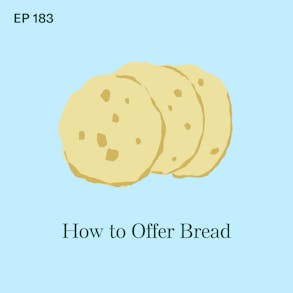
LISTEN TO THIS EPISODE
Episode Description
Is bread the best food for early eaters to eat? When can babies safely eat bread? In this episode we’re diving into bread for baby-led weaning, looking at sodium levels, swallowing safety and some simple ideas for non-bread carbohydrate foods your baby can more safely eat early on in BLW.
Links from this Episode
- Baby-Led Weaning with Katie Ferraro program with the 100 First Foods™ Daily Meal Plan, join here: https://babyledweaning.co/program
- Baby-Led Weaning for Beginners free online workshop with 100 First Foods™ list to all attendees, register here: https://babyledweaning.co/baby-led-weaning-for-beginners
Other Episodes Related to this Topic
- Episode 33 - Salt: 3 Easy Ways To Minimize Sodium For Your Baby

Latest Episodes
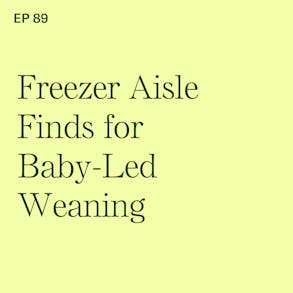
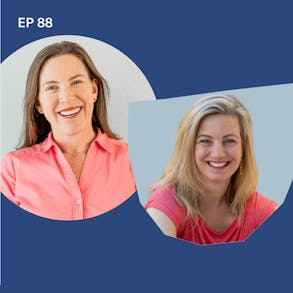
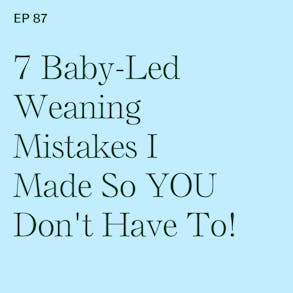
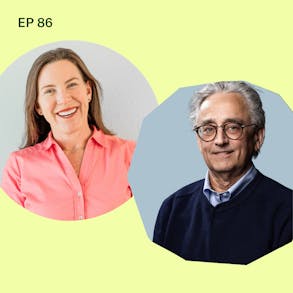
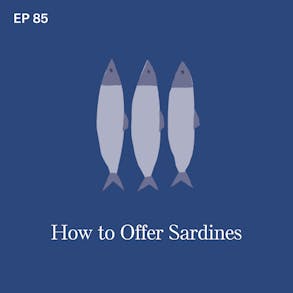
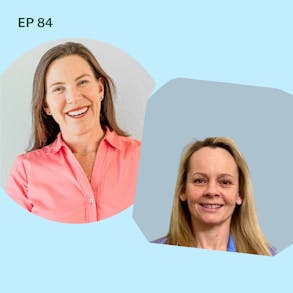
Katie Ferraro (0s):
So bread is definitely a food that I hold off on early on, and maybe Led Weaning because yeah, it has carved, but it's problematic for early eaters. For the two reasons I mentioned having to do with the safety and swelling and the overall nutrition, there's actually some safer, smarter ways for you to get carbs into your baby. That has nothing to do with Bread. Hey there Im Katie Ferraro Registered Dietitian college nutrition professor and mom of seven specializing in baby led weaning here on the baby led weaning made easy podcast. I help you strip out all of the noise and nonsense about feeding, leading you with the competence and knowledge you need to give your baby a safe start to solid foods using baby led weaning.
Katie Ferraro (41s):
Hey guys, welcome back today. We're talking about bread for Baby Led Weaning and When can babies safely eat bread? Now I am a huge fan of offering your baby a wide variety of foods, including carbohydrate rich foods, but there's a couple of reasons why bread is not the best food early on in Baby Led Weaning. So that's what we're going to explore today in this episode called Bread: when can babies safely eat bread? So let's get started with bread. Why first of all, would you want to do bread for Baby Led Weaning? Well, bread is a carbohydrate food, right? There's this little tweak that happens somewhere after the six month mark where babies start to need slightly more carbohydrates or calories from carbohydrate than they do from fat.
Katie Ferraro (1m 23s):
In the first six months. It's a little bit switched where fat is like super-duper important and carb is a little bit less. So, and then it swaps at the six month mark. And that's not like not like a flat light switch and it happens like overnight, but we're just aware of the fact that increasingly a little bit more of the calories are going to need to come from carbohydrate as your baby gets closer to that one-year age. And so we're in the weaning period, right? Where babies starting to get less nutrition from breast milk or formula and more nutrition from food with the goal being by the time they turn one, the baby is getting most of their nutrition from foods. So we use this weaning period six to 12 months as the practice period. So we want to be aware of offering baby a wide variety of foods for lots of different reasons, but also to make sure that they're getting enough carbohydrate, which is essentially the body's fuel that kind of keeps the car going.
Katie Ferraro (2m 9s):
So carbohydrate containing foods are great. And a lot of us, when we think about carbs, you think about bread. Now, most adults, of course, if they're following your typical Western or standard American diet, they eat too many carbohydrates and not the right type, right? A lot of refined white breads. And that's not a habit that we want to establish in our baby. So we're gonna talk a little bit about refined grains and whole grains today. But before we do, I want to dive into the safety aspect of bread. Now there's two primary reasons why I don't love bread for early eaters. We're talking six and seven month old babies in those first four or eight weeks of Baby Led Weaning before your baby kind of really has the hang of self feeding before it all clicks.
Katie Ferraro (2m 49s):
I steer clear of bread. I actually don't even do bread until closer to age one, but there's two reasons why the first one, and it's not more important than the other one, but as a dietitian, I always start with, it has to do with sodium. Okay. We want to minimize the amount of sodium that we offer a baby. And if you look at the sodium content on the food labels of the commercial bread products that you buy in a grocery store, like cruise down the bread aisle and just spend a few minutes looking at the salt content, it will blow your mind. Now, if this is blowing your mind and you're like, wait, what babies? Aren't supposed to have a lot of salt go back and listen to episode number 33, it's called Salt: Three easy ways to minimize sodium for your baby.
Katie Ferraro (3m 29s):
So back to the bread aisle, somebody has a bread camp, 200, 300 milligrams of sodium in them. And there's no hard and fast rules about like what's the max amount of sodium on baby can have my general rule of thumb is that I'm looking for less than 100 milligrams of sodium per serving of a food that I'm going to serve my baby. And the rationale there is most of the foods that I'm offering my baby don't come out of a package, right? I'm making them from scratch or their wholesome, no added salt foods. So if there's sometimes foods that are sometimes coming out of a package, they're going to have some salts in them, right? Cause it's a preservative makes foods taste great, but we do want to keep it on the smaller side. So I like less than a hundred milligrams. And also acknowledging that babies aren't eating the full adult portion, which is the portion that is posted on the food label.
Katie Ferraro (4m 10s):
So a hundred milligrams of sodium per serving of a food that I'm serving. My baby is generally my rule of thumb. Now take that to the bread aisle. It's pretty hard to apply almost all of the bread products that you'll see in a typical grocery store or bakery are going to have significantly more than a hundred milligrams of sodium. And there are low sodium breads out there. One of my favorite brands of low sodium bread is called Ezequiel bread, Ezequiel bread is a series of breads that a company called food for life makes and they're known for having wholesome whole grain options, but also a lot of low sodium bread options. So if you're at a typical grocery store in the United States, you generally can find at least one type of Ezequiel bread.
Katie Ferraro (4m 54s):
And it's usually a hundred percent, whole grain, which is great. We want babies to be eating whole grains and not a ton of refined grains. And if you're looking in your bread aisle and you don't see Ezequiel bread, it's probably in the freezer aisle kind of a weird place to find a loaf of bread, but almost all stores that have relatively decent sized will have Ezequiel bread or one low sodium option, but they can be kind of hard to find. And here's the problem with low sodium bread is that they are incredibly dry. So salt does a number of things in the baking process. It helps a little bit with the leavening process, the raising rising of the bread. It contributes flavor of course, but it also helps retain moisture in bread. So you take all of that salt out of the bread.
Katie Ferraro (5m 35s):
Low sodium breads are so dry and that's the problem for Baby Led Weaning because we don't want to be offering dry foods of any sort to baby, particularly dry starchy foods and dry protein foods. So when we're talking about the protein foods, I'm always recommending that you add a sauce or a dipper or a topper that's low in sodium to moisten things up. Same thing goes with the bread products. If you're doing a low sodium cracker or a low sodium bread, we actually do a whole separate episode on crackers because they're a little bit of a different bear, but some parents will just offer the strips of the low sodium bread. I definitely don't do that early on because it is so, so dry. So in addition to the sodium situation, the other reason that I don't love bread early on in Baby Led Weaning is that bread is made up primarily of starch.
Katie Ferraro (6m 19s):
Okay. So starches great because it's a source of carbohydrate or energy for our bodies, but the starchy part of the bread that started when the baby is eating it, it can ball up and form this bolus or this chunk of squishy starchy stuff that very easily can get stuck to the roof of your baby's mouth or the sides or the back. And your baby does not yet have the tongue strength in most cases early on in eating to safely clear that. So we don't want to unnecessarily challenge baby with what could be a potentially dangerous food. It's another reason why I don't love those little air puffs that are sometimes marketed as baby food. They're really, really tiny little star ones. They're just a pure starch ball.
Katie Ferraro (7m 0s):
Oftentimes with have added sugar and added salt, which is asinine because babies are not supposed to have added sugar and added salt. And yet they're always in the baby food products that are sold to parents. But on top of that, those little starch balls, if the baby even could pick them up and get them in their mouth, which they can't when your baby doesn't have their pincer grasp at six or seven months of age, but sometimes they do shove them into their mouth from their Palm. Those little starch balls are the exact same size that could potentially occlude the baby's airway, but that might also gum up and get stuck on the roof of the mouth. So there are safer ways to offer babies carbohydrates than to do bread. Now, those of you with older babies, when I, my baby's 10 months of age and we're at a restaurant and they grab a crust of bread and they're sucking on and on on it, if they've had experience with a wide variety of textures.
Katie Ferraro (7m 45s):
And if most of the foods that I'm offering are not high sodium foods like bread is at the end of the world. If your baby gnaws on the end of a piece of bread at a restaurant. No, absolutely not. However, early on in Baby Led Weaning, I do recommend staying away from bread until your baby has had experience with a variety of different, safer textures. And of course, lower sodium foods. So some of you might be like, okay, well fine. If carbohydrates are important and you don't love bread, then what types of carbohydrate containing foods can babies eat? Now, I'm a huge fan of offering babies, whole grains because across the board, they are more nutritious and more wholesome options than the refined grain counterparts babies occasionally eat refined grains, again, not the end of the world, but if you are working on offering baby a variety of foods, try to work those whole grains in.
Katie Ferraro (8m 35s):
So I have a hundred first foods list and I teach a hundred first foods approach to Baby Led Weaning, which I created back in 2016. And I do that using a five step feeding framework where we introduce your baby to five new foods a week, you do a new fruit on Monday, a new vegetable on Tuesday, a new starchy food on Wednesday, a protein containing food on Thursday and an allergenic food on Friday. And we do five new foods a week. That's 20 foods a month in five months before your baby turns one year old, they can have safely eaten 100 different foods, but every Wednesday is when we do that starchy foods category. So in my hundred first foods list, I have a list of 20 different starchy or carbohydrate containing foods that I would love to see you offer your baby before you do bread.
Katie Ferraro (9m 17s):
It takes about 20 weeks to get through that list. And then once your baby has been eating for 20 weeks, which is five months, they're super pros. And then you can definitely do bread. Do you want to do bread all the time? No, because of the sodium situation and we don't want to offer any one food to baby over and over or day in or day out, but there are foods inside of the hundred first foods lists that are great sources of carbohydrates, things like barley, buckwheat, Bulger, cornmeal, couscous. I've got farro on there. Freekeh some really weird whole grains that you might not have ever heard of like kamut, millet and oatmeal, polenta potatoes, quinoa, rice sorghum, spelt sweet potato teff, wheat germ. If you want to grab the whole hundred first foods list, including the 20 different non-bread sources of carbohydrate that you can feed your baby.
Katie Ferraro (10m 1s):
Many of which are whole grains. I give away my hundred first foods list to everybody on my free weekly workshop called baby LED WEANING FOR BEGINNERS. This is a free online workshop. It's a little bit longer. I know a lot of you are listening to these like mini trainings on the podcast, but if you want the whole like soup to nuts on Baby Led Weaning and how to start it, this free workshop is all about how to get your baby to eat a hundred foods before turning one, without you having to spoonfeed purees or buy pouches. And everyone on that free workshop gets the copy of the a hundred first foods list. Plus I have a big Q and a at the end actually make a point to answer every single question on the workshops. So if you want to sign up for this week's workshop times and grab your own copy of the a hundred first foods list. So you can offer 20 different carbohydrate containing foods before you do bread.
Katie Ferraro (10m 45s):
If you head to BabyLedWeaning.co, you can get signed up for this week's workshop times. You can grab your own a hundred first foods list and then start checking off those 20 different starchy foods that are not bread. And you'll be amazed. It's actually a great habit to get in, to be offering carbohydrate containing foods that aren't bread. Okay. A lot of us would just kind of fall back on bread, but there's lots of other foods out there that your baby can eat. And I've talked to a lot of parents get stuck in the rice and potatoes and pasta rut, and I get it. Those are fine sources of carbohydrate, but again, we've got 17 different ones on that list that you could be offering to your baby. So again, head to BabyLedWeaning.co if you want to get signed up for this week's workshop times. Now, what about gluten-free bread that occasionally we'll get questions about gluten-free.
Katie Ferraro (11m 27s):
If your baby has diagnosed with celiac disease. So celiac disease is an auto-immune condition, and it's when the body has a negative reaction to gluten, which is the protein found in wheat and rye and barley foods. So if your baby has an allergy to wheat, of course we don't offer wheat foods, but if your baby has a diagnosed celiac disease, then yes, you would be interested in searching for gluten-free products. However, if your baby doesn't have a wheat allergy or does not have diagnosed celiac, there's absolutely no reason for you to avoid gluten celiac is thought to affect a little bit less than 1% of the us population. Now infants can develop celiac around the time when they start being introduced to wheat rye and barley containing foods at six months of age, again, less than 1% of the US population has celiac disease.
Katie Ferraro (12m 13s):
But if there's a first degree relative who has celiac, so a parent or a sibling in the case of the baby, the risk goes way up one in 10 chance. So you would want to be more cognizant again, if you have a diagnosed celiac disease. And if that is the case with your baby, it's really important that you be working with a pediatric dietitian to make sure that your baby is meeting their nutrient needs. But for the other 99% of those of you out there who either, you know, therapy does not have celiac disease or no first degree relative in the family has diagnosed celiac. It's not something that you need to worry about. And on the a hundred first foods list in the starchy category, there are foods in there that both do contain gluten and do not contain gluten again, if your baby has no issues with gluten, cause they don't have celiac or they don't have a wheat allergy, then you don't need to be worried about the amount or the type of protein in the bread product.
Katie Ferraro (13m 0s):
Those whole grains that I mentioned too, a lot of those are on the a hundred first foods list. Those are all wonderful sources of iron. Yes, a lot of the refined white bread products. They have iron in them, but that's because it's been added back in. So they're called enriched bread products because sometimes parents say, oh, enrich, that sounds so much healthier. Well, they took the healthy whole grain, stripped it all down to the endos from, or the starchy middle took away all the nutrition and then had to add some nutrition back. So while you might see iron in white bread products, you're also gonna see a ton of salt. They might not be as safe for babies to swallow. Plus the whole grain alternatives, which have more nutrition, have more iron and have more fiber, which down the road is going to be important for your baby.
Katie Ferraro (13m 40s):
We want baby to be getting that wide variety of nutrition from whole grains whenever possible. But you know, some white breads in there, here and there, not the end of the world. So hopefully you guys learned a little bit about bread. It's something that I wait on until baby's about 10 or 11 months of age. I'll do it after they hit their hundred foods, because I want to make sure that I, especially as the primary food giver in the household am in the habit of making other carbohydrate containing foods that aren't just bread or refined grain, but also steering clear of bread is a great way to help reduce the sodium because bread products can be such a large portion of the sodium content of children's diet. It's just a habit that we don't want to get into.
Katie Ferraro (14m 20s):
If we can avoid it down the road, you got toddlers, a hundred percent, whole wheat bread. Great. Still a lot of sodium in some of these bread products, I was dying at the grocery store yesterday, just looking at these whole wheat flour tortillas. It was like almost 400 milligrams of sodium in them. And when you guys are choosing tortillas, it's also not one of my favorite foods because it can be quite challenging for baby to eat early on if they're dry, but we always opt for corn tortillas when possible over flour because corn tortillas almost never have any added sodium in them. Whereas the flour ones are crazy. So do me a favor. If you're at the grocery store, just take a peek at the sodium content of some of the breads. And it's really hard to find one less than a hundred milligrams. And even if you do that, one tends to be really dry. And as you know, we want to steer clear of offering dry foods to baby.
Katie Ferraro (15m 1s):
Now you can certainly, as your baby's getting more proficient, use the lower sodium brands. If you can find them and use a dipper or a topper to make it moist and soft, and it can be perfectly safe for your babies to eat, but it's like a big chunk of white bread. The first carbohydrate containing starchy food that I would offer a baby, probably not. If you want to get more information about all the hundred foods, your Babies can eat. Go ahead and check out that free workshop that I teach every week. Baby LED WEANING FOR BEGINNERS it's at BabyLedWeaning.co and I'm going to link to all of the resources that I shared in today's episode on the show notes for this episode, which you can find at blwpodcast.com/183. Thanks so much for listening and I'll see you next time.

The Program Baby-Led Weaning with Katie Ferraro
A step-by-step digital program for starting solid foods safely and navigating the original 100 FIRST FOODS™ meal plan with baby-led weaning.
 EXPERT-LED, PROVEN APPROACH TO EATING REAL FOOD
EXPERT-LED, PROVEN APPROACH TO EATING REAL FOOD CONCISE VIDEO TRAININGS TO MASTER BABY-LED WEANING
CONCISE VIDEO TRAININGS TO MASTER BABY-LED WEANING 100 FIRST FOODS DAILY MEAL PLAN WITH FOOD PREP VIDEOS
100 FIRST FOODS DAILY MEAL PLAN WITH FOOD PREP VIDEOS
Baby-Led Weaning for Beginners Free Workshop
Is your baby ready to start solid foods, but you’re not sure where to start? Get ready to give your baby a solid foundation to a lifetime of loving real food…even if you’re feeling overwhelmed or confused about this next stage of infant feeding.
Get baby-led weaning recipes and tips delivered to your email inbox.

